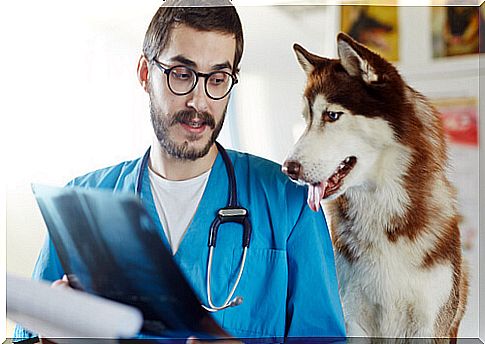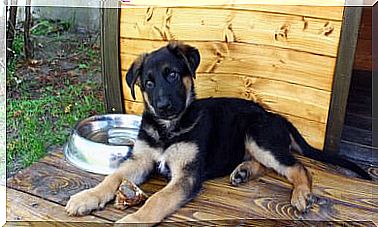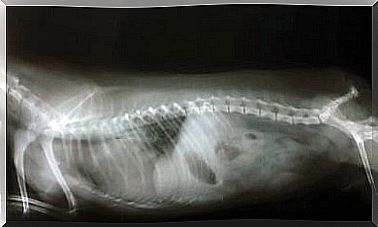Dangerous Dog Diseases For Humans

There are a number of dog diseases that you can catch and they are known as zoonotic diseases. The word zoonotic is used to designate any disease that is transmitted from animals to humans. The best known and most feared example of a zoonotic disease is rabies.
Although it is possible to contract diseases from the dog, the chances are slim. That said, the risk of getting a zoonotic disease increases if you have a compromised immune system due to a pre-existing disease or medical condition.
Examples of this are people infected with HIV or AIDS, pregnant women, patients treated with chemotherapy, or the elderly. Likewise, people with chronic diseases or congenital deficiency of the immune system, and those who have received organ or bone marrow transplants, are susceptible to contagion.
Most common and dangerous dog diseases
Capnocytophaga canimorsus
This bacteria lives in the saliva of cats and dogs. Although human infections are extremely rare, when C. canimorsus infects humans, it can be life threatening. It spreads through bites and scratches. Symptoms can include blood poisoning, shortness of breath, and meningitis.
Campylobacter jejuni
It is one of the most common causes of food poisoning. Although commonly spread through undercooked meats, this bacteria is also present in cat and dog feces, from where it can spread to humans.
Brucella canis
Canine brucellosis is spread by bacteria, which causes miscarriages and stillbirths in dogs, and is spread through vaginal secretions, urine, and potentially saliva. In humans, it can cause fever, fatigue, and weight loss, as well as inflammation of the liver, spleen, and lymph nodes.

Leptospira interrogans
This spiral-shaped bacteria, found in the urine of various pets, can make its way through the skin into the bloodstream. From there, it causes fever, vomiting, and diarrhea. If left untreated, infection in humans can cause kidney damage, meningitis, liver failure, and even death.
Tub
It is one of the dog’s diseases that attacks the surface of the skin, including the hair follicles and sometimes the dog’s nails. It is produced by a fungus, very contagious and of rapid reproduction.
Salmonellosis
This bacterium produces disorders such as lethargy, gastroenteritis, vomiting, spontaneous abortions and septicemia. Owners of dogs diagnosed with salmonellosis should be separated from their pets during the acute phase of the disease.
Giardia
It is a rapidly reproducing intestinal parasite. In general, it is asymptomatic, so your dog could be infected and transmit it to other dogs or humans and not perceive it. Its main symptom is diarrhea, but not frequent, but some days yes and many others not, which makes it more difficult to detect the disease.
Scabies
Also known as canine scabies, it is produced by a mite present in dust or vegetation. They feed on the epithelial cells in the skin of the host. It is one of the dog diseases that is potentially most transmissible to humans.
If I am at higher risk, should I gift my dog?
Do not! It just means that you have to be very cautious around your pet. In addition, there are many studies that have shown that the benefits of having a pet, especially if they suffer from chronic diseases, are immeasurable. In fact, sometimes doctors actually recommend pets for their sick patients.

Several steps can be taken to ensure your safety, including regular monitoring for signs of dog illness. Some basic hygienic practices such as washing your hands after handling your pet, and avoiding direct contact with your dog’s urine or feces, are prudent routines to consider.
Prevention against dog diseases
The best way to reduce or eliminate your risk of catching dog diseases is simple and comes down to hygiene and common sense. Here are some more specific suggestions:
- Make sure the dog’s diseases are treated in time. Be sure to visit the vet if your dog shows signs of discomfort or abnormal conditions. If your dog is sick, wash your hands after handling it.
- Keep your dog clean! Bathe him regularly; As you do so, examine him closely for signs of disease, especially skin lesions and rashes.
- Deworm your puppy. Broad-spectrum dewormers can prevent pinworms and other parasites.
- Avoid touching your dog’s feces when you go for a walk, use gloves or a bag to collect them and dispose of them immediately.
- Give your pets separate plates and water bowls.
- Wash your pet’s bedding often.
- Use flea and tick preventatives regularly.
- Wash bites and scratches immediately.
- Keep your pet indoors and do not allow him to eat garbage or drink from the toilet.
Keeping your pet healthy will also help keep you safe and away from dog illnesses. It is up to you to be vigilant through the basic advice we have just given you.









